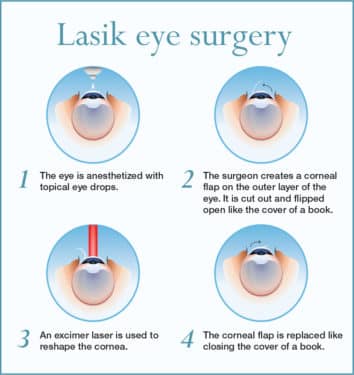Being Reluctant On SMILE Surgery? Look Into Vital Factors To Consider And Understandings To Help You Make An Educated Choice Concerning Your Aesthetic Future
Being Reluctant On SMILE Surgery? Look Into Vital Factors To Consider And Understandings To Help You Make An Educated Choice Concerning Your Aesthetic Future
Blog Article
Published By-Diaz Moss
If you're pondering SMILE eye surgery, ponder this: are you prepared to welcome prospective aesthetic freedom, or does the thought of any threats make you wait? Your choice will hinge on a cautious equilibrium of evaluating the benefits against the unpredictabilities. It's essential to dive much deeper right into the nuances of SMILE surgery to make an informed selection that lines up with your visual objectives.
Understanding SMILE Eye Surgery
When thinking about SMILE Eye Surgery, it is necessary to understand the procedure and its benefits. SMILE, which means Tiny Incision Lenticule Removal, is a minimally invasive laser eye surgical treatment that remedies common vision problems like nearsightedness (nearsightedness).
During https://lasik-research64543.atualblog.com/35314361/discover-the-multitude-of-reasons-behind-dry-eye-disorder-exposing-the-complexities-of-this-widespread-condition-together-with-actionable , your eye doctor will certainly make use of a femtosecond laser to create a small laceration in your cornea. Through this cut, a tiny disc of cells called a lenticule is gotten rid of, improving the cornea and fixing your vision.
Among the crucial advantages of SMILE Eye Surgery is its quick healing time. Several patients experience boosted vision within a day or two after the procedure, with very little pain.
Furthermore, SMILE is recognized for its high success price in offering long-term vision improvement. Unlike LASIK, SMILE does not need the creation of a flap in the cornea, decreasing the danger of difficulties and allowing for an extra steady corneal framework post-surgery.
Understanding the procedure and its benefits is essential when thinking about SMILE Eye Surgical treatment for vision adjustment.
Pros and Cons of SMILE
Considering SMILE Eye Surgical treatment for vision modification features different advantages and prospective drawbacks.
just click the next post of the major pros of SMILE is its minimally intrusive nature, as it entails a little cut and commonly causes fast recovery times. The treatment is likewise recognized for creating marginal discomfort and completely dry eye signs and symptoms post-surgery compared to other vision improvement methods. Furthermore, SMILE has been revealed to provide exceptional aesthetic results, with several individuals accomplishing 20/20 vision or better.
On the other hand, a potential con of SMILE is that it may not appropriate for people with extreme refractive errors, as the treatment array is rather minimal compared to LASIK. An additional factor to consider is that the discovering contour for surgeons executing SMILE can impact the schedule of experienced carriers in certain locations.
It is very important to evaluate these pros and cons very carefully when determining if SMILE is the best option for your vision adjustment requirements.
Determining Eligibility for SMILE
To identify if you're qualified for SMILE eye surgical treatment, your optometrist will perform a thorough assessment of your eye health and wellness and vision requirements. Throughout this evaluation, variables such as the stability of your vision prescription, the thickness of your cornea, and the total health and wellness of your eyes will certainly be assessed.
Usually, candidates for SMILE more than 22 years old, have a stable vision prescription for a minimum of a year, and have healthy corneas without conditions like keratoconus.
Your optometrist will certainly likewise consider your general eye health, any type of existing eye problems, and your way of living needs to establish if SMILE is the best choice for you. It's vital to connect any kind of specific visual needs or issues you may have during this examination to ensure that the therapy straightens with your assumptions.
If you aren't eligible for SMILE, your optometrist might advise alternate vision correction choices that much better match your individual demands and eye health and wellness status.
Final thought
Ultimately, making a decision whether SMILE eye surgical procedure is right for you needs careful consideration of your specific eye health and wellness and visual demands. Speak with your optometrist to identify your eligibility for the procedure and consider the possible benefits and disadvantages. Bear in mind to interact any type of worries or concerns you might have during the examination procedure to make an educated decision about your vision adjustment options.
